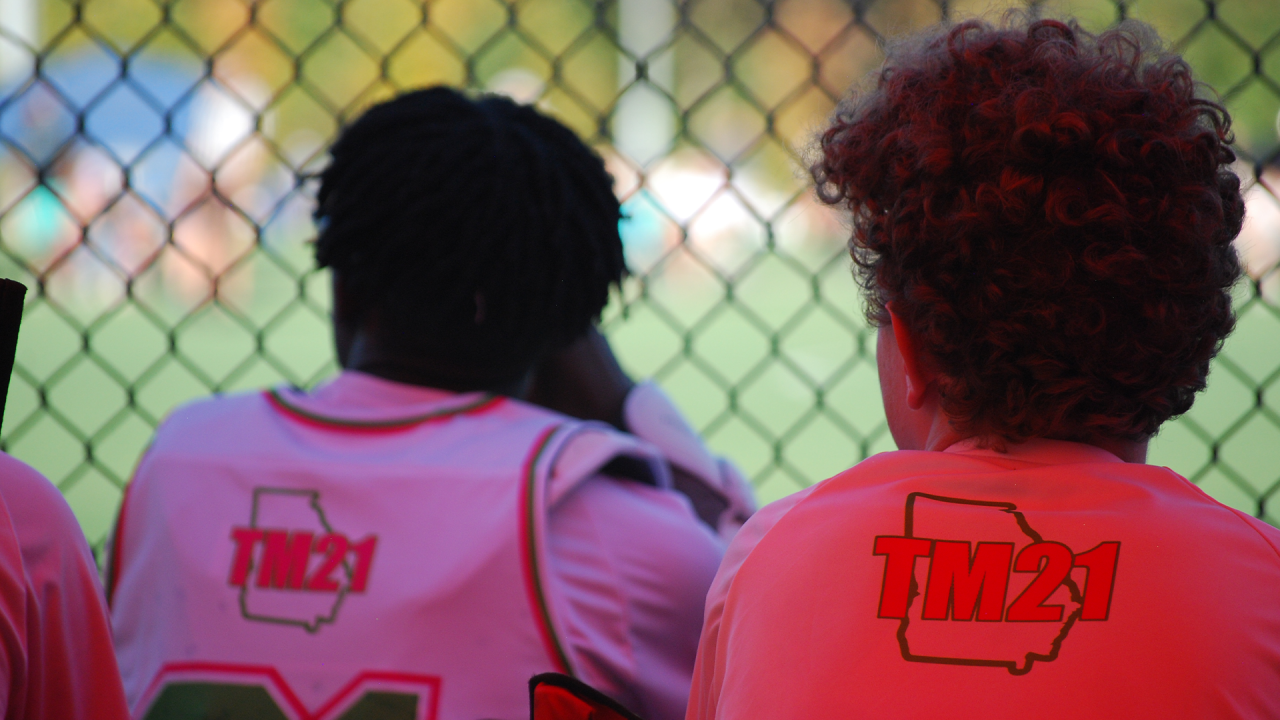
“Taylor on three, one, two, three, Taylor” broke the huddle on a hot summer Saturday lacrosse tournament in Gainesville, Georgia. Taylor was Taylor Mundy, a player few of the boys had ever met but whose initials and number were prominently displayed on all their uniforms: TM21.
Taylor Mundy, the son of Ken and Jessica, was a friend, teammate, and lacrosse goalie whose battle with mental health came to a tragic conclusion on the eve of his departure to college to play the sport he loved.
Taylor’s parents were determined not to let his name be forgotten as another unfortunate victim in the mental health crisis. They resolved that the Atlanta Kings club team had to continue, and it had to continue with Taylor as its purpose. The Atlanta Kings’ embrace of Taylor’s story must be another step forward in the struggle to understand mental illness.
In the realm of sports, where physical prowess often takes the spotlight, the significance of mental health is a vital yet frequently overlooked aspect of an athlete's well-being. Revered for their strength, agility, and determination, athletes are not immune to the challenges of mental health issues.
Recognizing and addressing mental health concerns in athletes is not just an obligation, it is a necessity for their overall health and performance. A sound mental state is the foundation upon which physical skills, endurance, and resilience are built. When mental health is prioritized, athletes can reach their full potential, not just in the sports arena but also in their personal lives. When it is not, there can be tragic consequences.
Unfortunately, in today's society, mental well-being, including that of athletes, remains sadly overlooked and mostly misunderstood. Mental health issues are often made to appear as a weakness, and inappropriate to speak openly about. This often leads to embarrassment and shame, causing those who struggle to lock their feelings away to fester.
Issues that a simple, “Hey, how are you?” could help are left unresolved and hidden from the people who care. While mental health organizations do play a vital role by offering resources, advocacy, and awareness to those affected by mental health issues, the challenge of how to implement this awareness in daily lives continues.
The great news is that the lacrosse community as a whole has stepped up to try to embrace these issues within the game. While often born of tragedies such as Taylor’s, the lacrosse community has seen the emergence of powerful programs, such as the 15 for Life Foundation at Syracuse and the Tommy O’Brien Fund at Notre Dame. But a gap remains at the daily level on the teams that lacrosse athletes live and practice with every afternoon. Closing this gap became a mission for Ken and Jessica and the Atlanta Kings.
The lacrosse world was blessed with an early advocate in closing the gap between awareness and action in Gordon Corsetti, who also suffered from mental illness and used lacrosse as an outlet. After attempting to take his own life multiple times, and eventually coming to terms with his illness, he wrote what is considered by many to be the most powerful lacrosse article of the past 25 years. On September 12, 2018, the noted referee and instructor put the struggles of his life on paper for the entire lacrosse world to read in USA Lacrosse Magazine, in an article entitle, Lacrosse Saved My Life.
The marker had been set. Corsetti put his story of struggle and self-harm out there so others would know they were not alone and to encourage people to be open with their stories. In the following years he wrote articles on his personal web site talking about his experiences and supporting mental health.
Gordon’s challenge to the lacrosse world did not emerge from a vacuum. The lacrosse community has long tried to be a positive light for those struggling with mental health. Gordon’s father, Lou Corsetti, is quick to note that “USA Lacrosse was ahead of the curve, even before Gordon,” and Gordon was able to put the lacrosse community even farther ahead of it by sharing his personal experiences. Others became more open with their stories and greater support emerged from within the lacrosse community.
Sadly, while Gordon eventually fell victim to his disease, Gordon’s father, Lou, said that Gordon, always remained very proud of the article. Lou said that Gordon was even prouder of his website, Mental Agility, where he continued to tell stories and support others.
Recognized by many as the godfather of the Atlanta lacrosse community, Lou Corsetti likens mental health to cancer; when you or someone you know is affected, you learn everything about it, and you talk openly about it. Gordon and his family were able to use these experiences to help others by sharing their stories. Sharing stories is a step forward. Sharing stories helps people learn.
Talking with a teammate who is struggling is one of the best things that can help. But it’s not always easy. Lou Corsetti said that oftentimes, he and other family members would have to ask Gordon two to three times before getting the real answer because it was locked away. Being persistent but supportive helps, but Corsetti adds one bit of caution. “Watch what you say because words have power, and can help or hurt more than you realize."
Being supportive as a friend or teammate can go pretty far in helping people. For every Gordon in the world, there is a person like his friend Ben, who was there on one of the initial nights Gordon tried to take his own life. Ben talked him out of it.
Mental illness can tell those affected that they aren’t good enough or what they are doing isn’t enough. So being a positive light in someone's world will go a long way. For this reason, Gordon created the slogan “take care of your crew” to promote the idea of caring for friends and teammates, a concept that the Corsetti family still supports.
The next challenge for the lacrosse community is to build these supportive connections and find ways to “take care of your crew.” One hopeful solution is to embrace mental health awareness and support at the team level, and at the level of your crew.
That is what the Mundy family is doing with the Atlanta Kings club, to honor the memory of their son Taylor. The easily overlooked but important way to help someone who is dealing with mental health issues is a personal connection. This became the goal for Ken and Jessica Mundy, to show the importance of connections.
Taylor started showing signs of mental health issues at a young age, but it was hard to diagnose and treat. Eventually, Taylor was diagnosed with bipolar disorder and was able to get help. While working hard on his condition, he was given the chance to play at Belmont Abbey College. His parents say that while this was one of the happiest moments for Taylor, his illness left him confused as to why the school gave him a chance. This type of reaction, we now know, is not uncommon. Unfortunately, just days before he left for college, Taylor lost his battle with mental health.
Ken and Jessica responded by keeping the Atlanta Kings going in his memory for high school players across Atlanta. It is here where they share his story with the players and their families to help battle mental health challenges. The Atlanta Kings is a lacrosse club looking to win games and improve player skills, just like any other club, but the Mundy’s hope is that its players and their families also learn to speak openly about mental health and learn to be willing to help others in their organization. Take care of your crew, as Gordon Corsetti would challenge.
“End the Stigma” is the Mundy’s simple mantra, and they do this by talking openly and often about Taylor’s life, and especially his illness, and creating an environment where the subject is not taboo. Having a mental illness doesn’t make anyone less of a person. Like Lou Corsetti, Ken and Jessica say, “it's just like any other illness.”
The stigma that mental health is a bad thing makes it scary to talk to people and keeps them from telling their family and friends about their struggles. They hope that through the Kings lacrosse team, they have created a platform for individuals to talk about their struggles with people who are understanding and listening, which was something they thought wasn’t done enough.
They found their audience at the team level, at the level of their crew. To signify this connection, the word “family” has been added to the team's gear near Taylor’s initials and number, TM21. The Mundys are finding success. Long weekends on the road at tournaments leave lots of time to connect one-on-one. Players know they will find Ken and Jessica in the hotel lobby, and that there is no sense trying to get to the elevator without stopping to talk.
Frank discussions of Taylor’s struggle have resonated with the team members and their families, with 2025 player Sean Lineweaver mentioning after a few years of open talk with Ken that Taylor’s story shows that “something could be happening with someone, and you don’t even know.” He adds, “I want to help them promote it.”
These open discussions have helped those who are struggling to understand it's okay to talk about the struggles. It has shown them that many people truly care and will listen. This feeling of being cared for is really important to the Mundys. TM21, Taylor’s initials and number, have been worn by people who haven’t ever been in the Kings lacrosse program and have just heard about him. This has shown how many people care to give meaning to his struggle even if they did not know him.
One challenge that Gordon and Taylor both faced was the expectation of “being a man,” and displaying a tough exterior and lack of emotion. Both Gordon’s and Taylor’s parents stressed that this isn’t true. Being tough is being willing to talk and admitting you are struggling. There is nothing wrong with showing that you are struggling or in pain. The challenge to players and their families is to make it possible to talk, to take care of your crew.
Lacrosse should be proud of its leadership in mental health. From organizations successfully promoting awareness, to the willingness to share struggles and present a plan of action, to the implementation of that plan at the team level with clubs like Taylor Mundy’s Atlanta Kings, and all the way down to sit-downs in the team hotel lobby, lacrosse is hopefully on its way to helping its players and families with the critical mental health challenge.
The challenge to everyone involved in lacrosse is to take care of your crew, as a teammate, as a coach, or as a friend.
Luke Burgar
Luke Burgar is a rising high school senior and a member of the Atlanta Kings club team.
Related Articles




